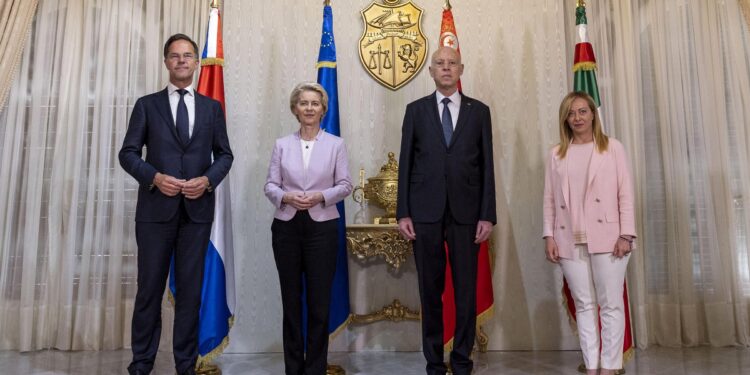The European Union finds itself in a precarious position as its ties strained with Tunisia, caught between preserving a crucial partnership and addressing mounting human rights concerns. A leaked internal document from the EU’s diplomatic service (EEAS) has brought to light the complex dynamics at play in this relationship, highlighting the challenges faced by the bloc in balancing its strategic interests with its commitment to democratic values and human rights.
Deteriorating Political Climate in Tunisia
The confidential report paints a grim picture of Tunisia’s political landscape under President Kais Saied. Since taking office in 2019, Saied has suspended parliament and consolidated power, leading to what EU officials describe as “a clear deterioration of the political climate and a shrinking civic space.” The buildup to the upcoming presidential elections on October 6 has been marred by the imprisonment of opposition figures and the prosecution of dissenters under the guise of combating misinformation.
The crackdown has extended beyond political opponents to include journalists, lawyers, businesspeople, and even individuals working for NGOs that assist migrants. Many of these organizations are partners in EU-funded programs, further complicating the relationship between the two entities. The arrest of veteran human rights activist and journalist Sihem Bensedrine, ordered into pre-trial detention on August 1, exemplifies the growing repression in the country.
The Controversial EU-Tunisia Migration Pact
At the heart of this strained relationship lies the 2023 EU-Tunisia migration pact. This agreement, aimed at curbing migration flows to Europe, has come under intense scrutiny. Critics argue that it effectively bankrolls a dictatorial regime, compromising the EU’s moral standing and commitment to human rights.
The EU promised Tunisia €105 million in 2023 to combat people smuggling, adding to an existing multimillion-euro border-control fund. However, the Tunisian government later claimed to have returned €60 million to Brussels, raising questions about the implementation and effectiveness of the agreement.
The EEAS report acknowledges the “public outcry and scrutiny” surrounding the mistreatment of migrants and asylum seekers in Tunisia, often implicating local authorities. This situation raises “critical questions about EU’s support to border management authorities” and highlights the ethical dilemmas inherent in the migration deal.
Ties Strained: EU’s Credibility at Stake
As ties strained between the EU and Tunisia, the bloc faces a significant challenge to its credibility. The leaked document explicitly states the difficulty in “striking an increasingly difficult balance between the EU’s credibility in terms of values and its interest in staying constructively engaged with the Tunisian authorities.”
The EU fears that without continued support, Tunisia may fall under the influence of “hostile third countries,” likely referring to Russia, Iran, and China. This geopolitical concern adds another layer of complexity to the already fraught relationship, as the bloc attempts to maintain its influence in the region while upholding its principles.
Critics, including MEP Udo Bullmann, argue that the EU has effectively “granted EU taxpayer’s money to an authoritarian regime that tries to restrict all opposition through inhuman methods.” This criticism underscores the ethical quandary faced by the EU as it navigates its relationship with Tunisia.
The strained ties between the EU and Tunisia epitomize the challenges faced by the bloc in its foreign policy. As it seeks to manage migration, maintain regional stability, and uphold its values, the EU finds itself in an increasingly untenable position. The leaked report serves as a stark reminder of the complexities involved in international diplomacy and the often-conflicting priorities that shape policy decisions.
EU must carefully reconsider its approach to Tunisia and similar partnerships. Balancing strategic interests with a commitment to human rights and democratic values will be crucial in maintaining the bloc’s credibility on the global stage. As the situation in Tunisia continues to evolve, the EU’s response will likely set a precedent for how it handles similar dilemmas in the future, potentially reshaping its foreign policy approach in the process.
















